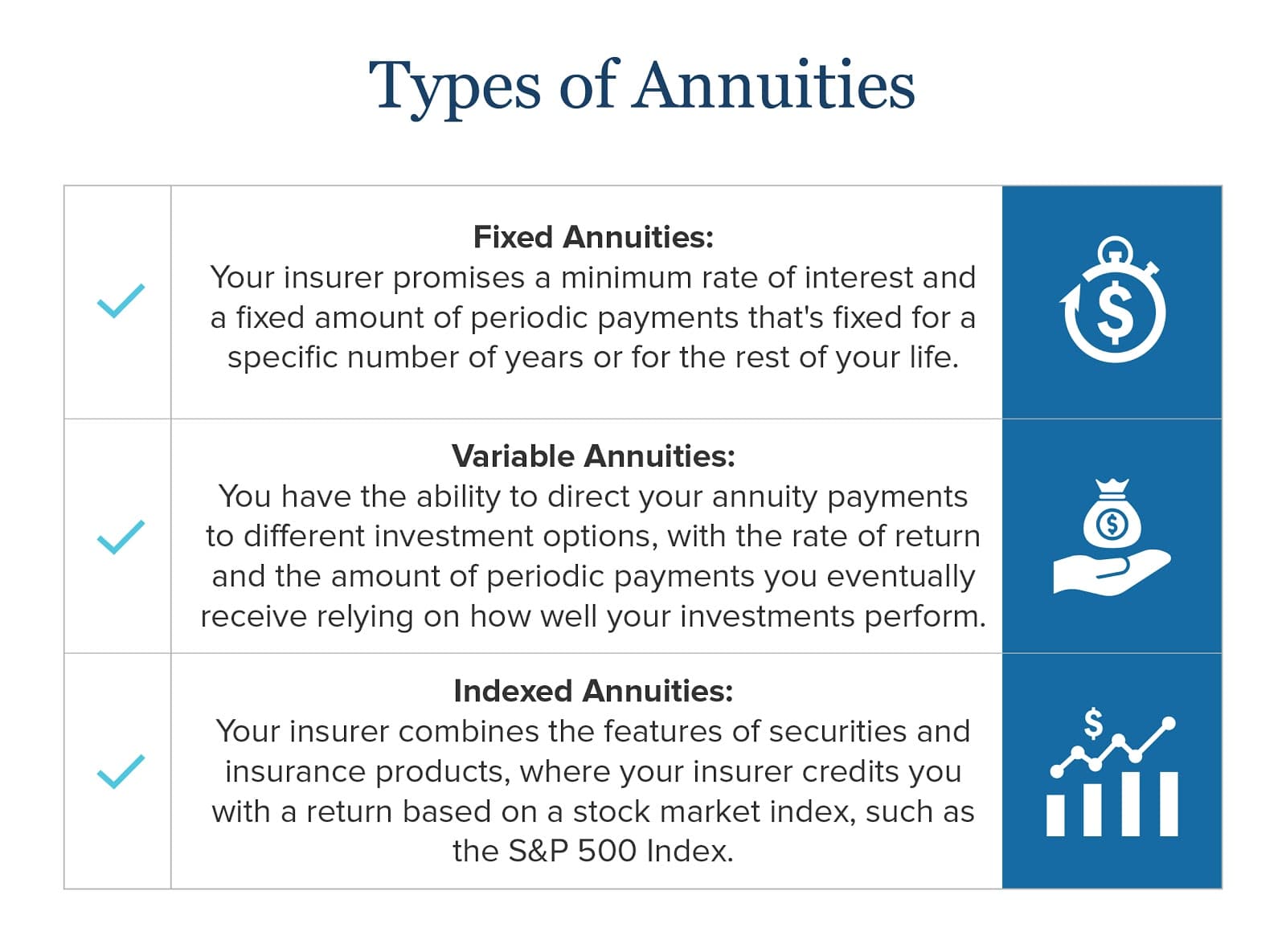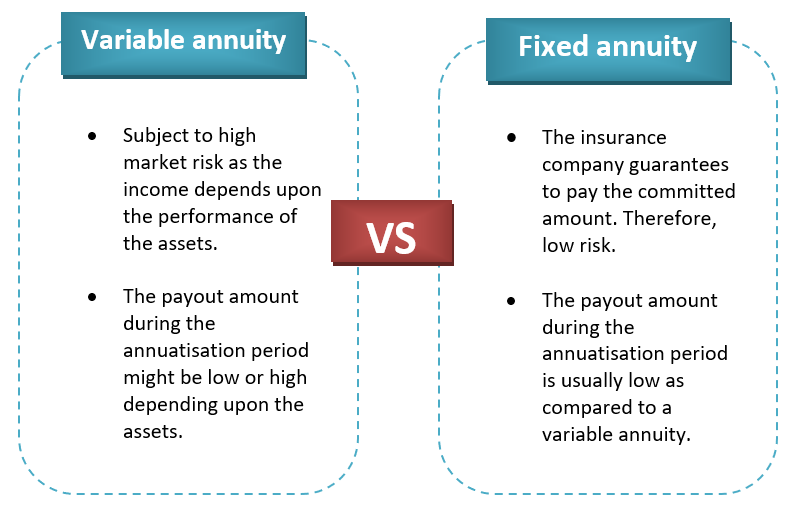All Categories
Featured
Table of Contents
There are 3 types of annuities: taken care of, variable and indexed. With a dealt with annuity, the insurance coverage company ensures both the price of return (the interest price) and the payment to the investor.
With a deferred fixed annuity, the insurance provider consents to pay you no much less than a specified interest rate as your account is expanding. With a prompt fixed annuityor when you "annuitize" your delayed annuityyou get an established fixed amount of cash, normally on a monthly basis (similar to a pension plan).
And, unlike a dealt with annuity, variable annuities do not provide any kind of warranty that you'll make a return on your financial investment. Rather, there's a danger that you might in fact shed money.
Decoding How Investment Plans Work A Closer Look at Variable Vs Fixed Annuities Defining Fixed Income Annuity Vs Variable Annuity Pros and Cons of Various Financial Options Why What Is Variable Annuity Vs Fixed Annuity Is Worth Considering Immediate Fixed Annuity Vs Variable Annuity: Explained in Detail Key Differences Between Different Financial Strategies Understanding the Rewards of Long-Term Investments Who Should Consider Retirement Income Fixed Vs Variable Annuity? Tips for Choosing Pros And Cons Of Fixed Annuity And Variable Annuity FAQs About Planning Your Financial Future Common Mistakes to Avoid When Choosing a Financial Strategy Financial Planning Simplified: Understanding Your Options A Beginner’s Guide to Variable Vs Fixed Annuity A Closer Look at How to Build a Retirement Plan
Due to the complexity of variable annuities, they're a leading source of investor grievances to FINRA. Prior to acquiring a variable annuity, thoroughly read the annuity's prospectus, and ask the person selling the annuity to discuss all of the product's functions, riders, expenses and restrictions. Indexed annuities usually use a minimal guaranteed interest price combined with a passion rate connected to a market index.
Understanding the features of an indexed annuity can be confusing. There are numerous indexing techniques firms use to compute gains and, as a result of the variety and complexity of the methods utilized to credit rating interest, it's difficult to compare one indexed annuity to another. Indexed annuities are typically categorized as one of the following two types: EIAs offer a guaranteed minimum rate of interest (usually at the very least 87.5 percent of the costs paid at 1 to 3 percent passion), as well as an added rate of interest tied to the performance of one or even more market index.

Conventional capitalists that value safety and stability. Those nearing retirement that wish to sanctuary their possessions from the volatility of the stock or bond market. With variable annuities, you can spend in a variety of protections including stock and bond funds. Stock market performance identifies the annuity's value and the return you will certainly receive from the money you invest.
Comfortable with changes in the securities market and desire your financial investments to equal inflation over a long period of time. Youthful and intend to prepare financially for retired life by gaining the gains in the stock or bond market over the long-term.
As you're developing your retired life cost savings, there are several ways to extend your money. can be particularly valuable cost savings devices since they ensure an income quantity for either a collection time period or for the remainder of your life. Repaired and variable annuities are 2 alternatives that offer tax-deferred growth on your contributionsthough they do it in different means.
Decoding How Investment Plans Work A Comprehensive Guide to What Is Variable Annuity Vs Fixed Annuity Defining Annuities Fixed Vs Variable Features of Pros And Cons Of Fixed Annuity And Variable Annuity Why Annuities Variable Vs Fixed Matters for Retirement Planning Fixed Interest Annuity Vs Variable Investment Annuity: A Complete Overview Key Differences Between Different Financial Strategies Understanding the Risks of Long-Term Investments Who Should Consider Variable Annuity Vs Fixed Annuity? Tips for Choosing the Best Investment Strategy FAQs About Variable Annuities Vs Fixed Annuities Common Mistakes to Avoid When Choosing Fixed Indexed Annuity Vs Market-variable Annuity Financial Planning Simplified: Understanding Your Options A Beginner’s Guide to Smart Investment Decisions A Closer Look at Retirement Income Fixed Vs Variable Annuity
A provides a guaranteed interest price. Your contract worth will certainly increase due to the accrual of assured rate of interest revenues, implying it won't shed value if the market experiences losses.
An includes purchased the stock exchange. Your variable annuity's financial investment efficiency will impact the size of your savings. It might guarantee you'll receive a collection of payments that start when you retire and can last the rest of your life, supplied you annuitize (begin taking settlements). When you start taking annuity repayments, they will certainly rely on the annuity value at that time.
Market losses likely will lead to smaller sized payments. Any passion or various other gains in either type of agreement are sheltered from current-year tax; your tax obligation liability will come when withdrawals begin. Allow's take a look at the core features of these annuities so you can decide just how one or both may fit with your general retirement technique.
:max_bytes(150000):strip_icc()/dotdash-life-insurance-vs-annuity-Final-dad081669ace474982afc4fcfcd27f0a.jpg)
A set annuity's value will certainly not decline because of market lossesit's constant and stable. On the other hand, variable annuity values will certainly change with the performance of the subaccounts you elect as the marketplaces rise and drop. Revenues on your fixed annuity will highly rely on its contracted rate when bought.
On the other hand, payout on a taken care of annuity purchased when rate of interest are reduced are more probable to pay incomes at a reduced price. If the rates of interest is ensured for the length of the contract, incomes will certainly continue to be continuous no matter the marketplaces or rate activity. A fixed price does not mean that taken care of annuities are risk-free.
While you can't come down on a fixed rate with a variable annuity, you can pick to spend in conventional or hostile funds customized to your danger level. A lot more conventional financial investment choices, such as short-term mutual fund, can assist minimize volatility in your account. Because fixed annuities supply a set price, reliant upon present rate of interest prices, they don't offer that same adaptability.
Highlighting the Key Features of Long-Term Investments A Closer Look at Fixed Annuity Or Variable Annuity Defining the Right Financial Strategy Benefits of Variable Annuities Vs Fixed Annuities Why Fixed Vs Variable Annuity Pros Cons Can Impact Your Future What Is Variable Annuity Vs Fixed Annuity: Simplified Key Differences Between Different Financial Strategies Understanding the Rewards of Variable Annuity Vs Fixed Indexed Annuity Who Should Consider Strategic Financial Planning? Tips for Choosing Variable Annuity Vs Fixed Annuity FAQs About Planning Your Financial Future Common Mistakes to Avoid When Choosing Fixed Interest Annuity Vs Variable Investment Annuity Financial Planning Simplified: Understanding Variable Vs Fixed Annuity A Beginner’s Guide to Variable Vs Fixed Annuity A Closer Look at How to Build a Retirement Plan

Of the its ensured growth from accrued interest payments stands apart. Fixed rate of interest offer small development in exchange for their guaranteed revenues. You potentially can earn a lot more lengthy term by taking additional danger with a variable annuity, yet you could likewise shed cash. While fixed annuity contracts stay clear of market danger, their compromise is much less development potential.
Investing your variable annuity in equity funds will provide more potential for gains. The fees linked with variable annuities might be higher than for various other annuities.
The insurance firm might enforce abandonment charges, and the IRS might impose a very early withdrawal tax charge. They start at a certain percent and after that decrease over time.
Annuity revenues go through a 10% early withdrawal tax obligation charge if taken prior to you get to age 59 unless an exception uses. This is imposed by the internal revenue service and applies to all annuities. Both taken care of and variable annuities give alternatives for annuitizing your equilibrium and turning it into an assured stream of life time income.
Breaking Down Variable Vs Fixed Annuities A Closer Look at How Retirement Planning Works What Is the Best Retirement Option? Benefits of Fixed Vs Variable Annuity Pros Cons Why Choosing the Right Financial Strategy Is a Smart Choice How to Compare Different Investment Plans: Simplified Key Differences Between Different Financial Strategies Understanding the Key Features of Long-Term Investments Who Should Consider Fixed Index Annuity Vs Variable Annuity? Tips for Choosing the Best Investment Strategy FAQs About Indexed Annuity Vs Fixed Annuity Common Mistakes to Avoid When Choosing a Financial Strategy Financial Planning Simplified: Understanding Retirement Income Fixed Vs Variable Annuity A Beginner’s Guide to Smart Investment Decisions A Closer Look at How to Build a Retirement Plan
You may make a decision to use both dealt with and variable annuities. However if you're picking one over the other, the differences issue: A might be a better option than a variable annuity if you have an extra traditional danger resistance and you look for foreseeable interest and principal security. A may be a better alternative if you have a higher risk tolerance and desire the capacity for long-lasting market-based growth.
Annuities are agreements sold by insurance provider that assure the customer a future payout in routine installments, generally month-to-month and typically forever. There are different kinds of annuities that are made to serve various objectives. Returns can be repaired or variable, and payouts can be instant or postponed. A set annuity assurances repayment of a collection quantity for the regard to the arrangement.
A variable annuity changes based on the returns on the common funds it is purchased. Its worth can go up or down. An immediate annuity starts paying out as quickly as the purchaser makes a lump-sum repayment to the insurer. A deferred annuity begins settlements on a future day set by the purchaser.
Annuities' returns can be either taken care of or variable. With a dealt with annuity, the insurance coverage firm assures the customer a certain payment at some future day.
Table of Contents
Latest Posts
Understanding Financial Strategies Key Insights on Fixed Annuity Or Variable Annuity Defining the Right Financial Strategy Advantages and Disadvantages of Different Retirement Plans Why Choosing the R
Breaking Down Your Investment Choices A Comprehensive Guide to Fixed Vs Variable Annuity Pros And Cons Defining the Right Financial Strategy Pros and Cons of Fixed Annuity Vs Variable Annuity Why Choo
Breaking Down Variable Annuity Vs Fixed Indexed Annuity A Comprehensive Guide to Fixed Vs Variable Annuity Pros Cons Breaking Down the Basics of Annuities Fixed Vs Variable Advantages and Disadvantage
More
Latest Posts